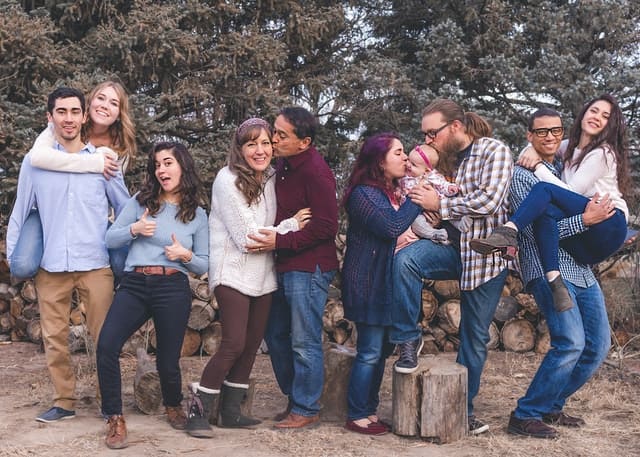We all want fulfilling relationships, but often feel like we don’t know how to make them happen.
When we are in a relationship, it’s easy to get caught up in the day-to-day. With work and personal obligations, it’s hard to make time for our partner or spouse. But when we make an effort and find ways to connect with them, they will feel more fulfilled in their relationships. We all want to have fulfilling relationships, but often feel like we don’t know how to make that happen. Consider this, mindful relationships are more fulfilling relationships.
When we’re making an effort and connecting with our partners or spouses we can feel that we’re getting closer. So be present and enjoy time together and doing things for each other. It doesn’t have to be anything elaborate either, just something as simple as making breakfast in bed for your partner is a great way to connect. We all want fulfilling relationships, and by being mindful we can achieve that goal.

KEY POINTS
- Using mindfulness in your relationships can help to have more fulfilling relationships, feel more optimistic and relaxed in your interactions with others, and more accepting and closer to your partner, spouse, family, friends, and coworkers.
The Significance of Relationships in Our Lives
Relationships are what make life worth living. We all want to be appreciated and acknowledged for who we are and what we do. That’s where relationships come in.
Sometimes, we can grow complacent with the way we relate to people, and we need to take a step back and re-evaluate how we’re interacting with others. It can be tough to be vulnerable, but when done correctly, it leads to vulnerability leads to intimacy leads to connection leads to fulfillment.
There is such a thing as mindful relationships – these are more fulfilling relationships because they take both people’s needs into account equally. But when you get right down to it, how do you know if the person you’re with is mindful in their relationship?
It’s important to be mindful in all of our relationships, not just romantic ones. We have family relationships with mothers, fathers, brothers, sisters. We have friends that we have a different type of relationship we cultivate. In your work setting, you probably have lots of co-workers, bosses, etc. whom you interact with daily. These are all different forms of relationships.
Each of these relationships is unique in its own way. You have a more intimate relationship with your partner, a close relationship with your friends, and likely a loving relationship with your family. Coworkers are people that you need to get along with to carry out business each day.
With so many different relationships, how are you supposed to juggle each one of them? Additionally, it’s hard to pay attention when there are so many other distractions occurring in your world.
You can get so caught up in all the other demands in your life that you do not focus your complete and undivided attention on those whom you are closest to in your life.
Mindful Relationships – how to have richer, more fulfilling relationships
It’s not difficult to have fulfilling relationships. The only thing you need is a little proactive effort. Apply mindful awareness.
To use mindfulness in relationships, you have to take an honest look at how you connect with each of these people and your feelings toward them. If you want to deepen your relationship with this person, you must acknowledge your present relationship status.
Take a close look at each of the relationships in your life. How are you related to that person? How well do you relate to them? Start a list for your partner, your family, your friends, your coworkers. Are you kinder to some than others? Are you more gentle? Do you treat others with not so much respect because your relationship has grown tiresome?
Look at all of your relationships with fresh eyes. Mindfulness allows you to reflect upon why you are unkind, why you do love that person, how you can improve or heal a relationship.
Don’t try to do this all in one sitting. Start a journal. Put each person on a different page and see what happens. Write down all the good, the bad, and the ugly.
Get the free guide Quiet Confidence: A Men’s Guide to Living a Free, Authentic, Joyful, Centered, & Purposeful Life”
This workbook will provide you with an introduction to mindfulness as a foundation for living a more deliberate, authentic, purposeful life of peace, freedom, health, and fulfillment.
You’ll also signup for the newsletter to get valuable content right in your inbox.
Your privacy is respected. Data will never be sold or shared. Unsubscribe at any time.
Mindfulness integrates your emotional and intellectual sides
Mindfulness integrates your brain’s emotional side with your intellectual side, allowing you to deal with your emotions in a more integrated way.
Meditating on love and kindness towards those on your list can allow you to look at someone in a different light. Mindfulness can open your heart and your mind to see people for who they truly are. Maybe someone is having a bad experience in their life, and whereas you thought they were being rude, they might be going through a tough time.

In your relationship with your partner, try to understand the complicated emotions that they may be going through. Try to take deep breaths and move toward the feeling and away from overreacting. By doing this, you will allow the other person to see your willingness to understand them in a loving, responsive way completely.
Mindfulness will allow the compassionate side of you to shine through. You can genuinely accept someone if you are willing to look at them for who they are where they are in their life. No two people are alike, and no one travels the same road as anyone else. We are all unique individuals.
Practicing mindfulness will give you the patience to understand someone else’s challenging times and give you the patience and wisdom to understand the situation. You can be there to help someone move through these difficult situations via your use of mindfulness.
You need to stay present for someone even though they may have shortcomings, especially with those you love. Accept them for who they are, faults and warts included, to acknowledge your expectations and perceptions.
Mindfulness reduces stress
It is all too easy to overreact to small problems and let things get blown out of proportion. Practicing mindfulness meditation reduces your stress levels, so arguing is less likely to take place.
Following these principles, we can see ourselves as compassionate human beings who can deal with our own and others’ difficult emotions. This, in turn, allows for increased communication and growth within those relationships.
Mindfulness allows you to pause and reflect. When you see a fight or argument approaching, it can sometimes end up in miscommunication where no one gets their point across, and it can often leave the situation worse off than when it started
Try to be present when you interact with the person in the relationship you are trying to mend or make better. What are you thinking? What does this person need from you right now? Put yourself in the other person’s shoes to see what they see and might think about you.
If you take the time to take a step back and pause for a moment before heading straight into the storm, you allow yourself the gift of deepening your relationship with yourself and those you love. The opposite of “mindful” is “mindless,” which is where you end up without using mindfulness techniques: reinforcing negative mindless responses.
Try mindful listening when you speak with the other person. There is nothing like feeling like you are understood. For you to make someone feel that way, you have to be willing to stop everything else and listen to the other person. Focus your full attention, and don’t let your mind wander off. Do you think they felt understood and appreciated?
By practicing mindful communication, it has far-reaching benefits and enriches not only our lives but the lives of those with whom we interact. Mindfulness takes practice, so don’t expect results overnight.
Mindfulness helps build empathy
Like most of us, you are most likely often on auto-pilot when it came to your feelings. With mindfulness, you can become more conscious and aware of your state of mind. You can become in tune with your emotions and can feel a sense of empathy. Learning empathy can help in dealing with your partner; it allows you to be a more caring, kind, and understanding individual.
What you can expect over time when you use mindfulness to relate with others is that you become aware of how habitual patterns can continually bring down your relationships, so you always want to remember to move toward mindful communication.
Other benefits of practicing mindful communication allow you to be gentler and kinder with yourself. Being aware will enable us to connect with our own needs and how we can respectfully request that others be mutually mindful, enriching the relationship experience for both parties.
Remember that you are still dealing with the fragile human ego. Mindfulness is a slow process and can cause frustration in the beginning. Overall, though, mindfulness lets you achieve the end goal: to be loving in all of our relationships.
Are your expectations being met in this relationship? Are you accepting of the person, or did you expect to change? Were you demanding? Are you positive and clear about your intentions? Did you treat them with compassion? Are you taking care of yourself so you can put your best foot forward in the relationship?

Mindful Relationships Through Mindfulness
- Mindfulness integrates your brain’s emotional side with your brain’s intellectual side, allowing you to deal with your emotions in a more integrated way.
- Mindfulness reduces stress in your life. It is all too easy to overreact to small problems and let things get blown out of proportion. Practicing Mindfulness meditation reduces your stress levels, so arguing is less likely to take place.
- Mindfulness helps you to build empathy. Unlike before practicing mindfulness, you were most likely on auto-pilot when it came to your feelings. Now, you can become more conscious and aware of your state of mind. You can become in tune with your emotions and can feel a sense of empathy. Learning empathy can help in dealing with your partner; it allows you to be a more caring, kind, and understanding individual.
Journal about the last time you “felt” like this. What did you notice as far as emotions while you were practicing mindfulness in a relationship? Did you stay focused on this person and this person only? Were you thinking about someone living or someone who has passed? What did you feel? Did you have feelings of sadness, loss, or regret?
Using mindfulness in your relationships can help you to have more fulfilling relationships, feel more optimistic and relaxed in your interactions with others, and be more accepting and closer to your partner, spouse, family, friends, and coworkers.
“Good questions outrank easy answers.” – Paul A. Samuelson (American economist)
Ask yourself some questions as you navigate any relationship (especially if you looked at the person with anger or fear) and as you look back at your history with that person:
- What emotion(s) were you experiencing at the time?
- Did you overreact? If you didn’t overreact, was it because you allowed yourself some time and space before you reacted?
- What was going on with your body? Were you tense? Relaxed? Calm?
- What were you feeling right before the overreaction? Were you thinking about being hungry, how tired you were at the moment, frustrated with others, happy about something that had just happened?
- What was your reaction, and how did you deal with the situation?
- What worked this time, and what will you do next time? (For instance, did you go for a walk, listen to music, use mindful breathing, etc.)
Want more? Get the free guide “Quiet Confidence: A Men’s Guide to Living a Free, Authentic, Joyful, Centered, & Purposeful Life“
This workbook will introduce mindfulness as a foundation for living a more deliberate, authentic, purposeful life of peace, freedom, health, and fulfillment.







